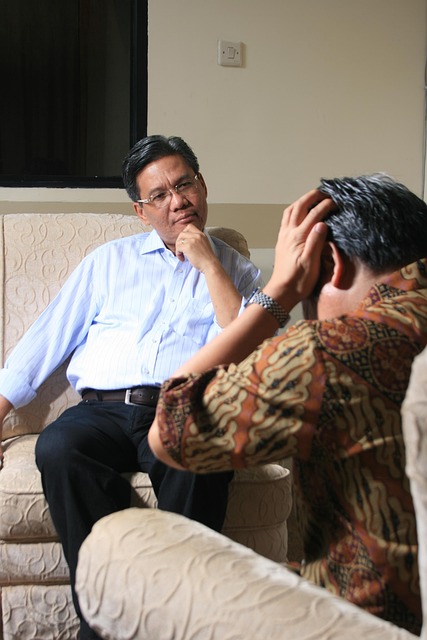
Category: marriage counseling online
Marriage Counseling Online: A Comprehensive Guide
Introduction
In today’s digital age, seeking support for relationships has taken on a new dimension with the rise of online marriage counseling. This innovative approach to mental health services offers couples a convenient, accessible, and often more affordable alternative to traditional in-person therapy. The global shift towards digital solutions for various aspects of life, including mental well-being, has opened doors for marriage counseling to reach a broader audience worldwide.
This article aims to provide an in-depth exploration of online marriage counseling—its definition, history, benefits, challenges, and its significant impact on couples seeking support. By delving into these aspects, we will uncover the potential for this field and its role in transforming traditional therapeutic practices.
Understanding Marriage Counseling Online
Definition and Core Components
Marriage counseling online, also known as virtual or digital marriage therapy, refers to the delivery of professional counseling services for couples via online platforms. It involves a trained therapist or counselor facilitating sessions through video conferencing, instant messaging, email, or dedicated online therapy apps. The core components include:
- Assessment: Initial evaluations to understand the couple’s dynamics, identify issues, and set therapeutic goals.
- Intervention: Utilizing various evidence-based techniques to address relationship challenges.
- Support: Ongoing guidance, resources, and strategies to help couples implement changes in their daily lives.
- Monitoring: Regular check-ins to assess progress, adjust treatment plans, and ensure continued support.
Historical Context and Evolution
The concept of online counseling has its roots in the early days of the internet when text-based communication platforms enabled basic therapy sessions. However, significant advancements in technology and a growing acceptance of digital health services have propelled marriage counseling online into a thriving field.
In the 1990s, early forms of online therapy emerged, primarily focused on individual mental health support. As internet access became more widespread, the potential for delivering counseling to couples gained recognition. The turn of the millennium saw the development of specialized software and platforms tailored to marital therapy, marking a significant milestone in its evolution.
Today, with high-speed internet connectivity and user-friendly video conferencing tools readily available, online marriage counseling has become a viable and preferred option for many couples seeking help.
Global Impact and Trends
International Reach and Adoption
Marriage counseling online has transcended geographical boundaries, offering support to couples in diverse regions worldwide. The accessibility of digital services allows individuals from urban centers and remote areas alike to access professional therapy without the constraints of physical proximity to specialists.
According to a 2022 report by the World Health Organization (WHO), the demand for online mental health services has increased globally, with marriage counseling online gaining traction in regions such as North America, Europe, and parts of Asia-Pacific. This growth is attributed to factors like rising awareness, improved internet infrastructure, and changing societal attitudes towards seeking help for relationship issues.
Regional Trends and Disparities
While the global trend shows a growing acceptance of online counseling, regional disparities exist in terms of availability and adoption rates:
- North America: Leading the way in digital therapy, with well-established platforms offering specialized services for couples. The U.S., in particular, has seen a surge in online marriage counseling due to factors like affordability and accessibility.
- Europe: Many European countries have integrated online counseling into their healthcare systems, providing accessible services to residents across borders.
- Asia-Pacific: The region’s diverse cultural landscape presents unique challenges and opportunities. While some countries have embraced digital therapy, others face challenges related to internet infrastructure and cultural norms regarding mental health.
- Latin America and Middle East: These regions are witnessing a growing interest in online counseling, driven by factors like privacy concerns and the desire for more affordable options.
Economic Considerations
Market Dynamics and Investment
The global online therapy market, including marriage counseling services, has experienced substantial growth in recent years. This expansion is fueled by increasing digital literacy, rising mental health awareness, and the convenience and accessibility of digital solutions. According to a 2021 report by Grand View Research, the global online therapy market size was valued at USD 5.9 billion in 2020 and is projected to grow at a CAGR of 17% from 2021 to 2028.
Within this market, marriage counseling online represents a niche yet rapidly growing segment. Investors and venture capitalists have shown a keen interest in digital therapy startups, recognizing the potential for disruptive innovation in traditional mental health services. Funding rounds for companies offering online marriage counseling have increased, reflecting the industry’s attractiveness and growth prospects.
Cost-Effectiveness and Affordability
One of the significant advantages of marriage counseling online is its potential to make professional therapy more accessible and affordable. Traditional in-person sessions can be costly, often requiring couples to travel and incur additional expenses for childcare or other arrangements. Online counseling eliminates these barriers:
| In-Person vs. Online | Cost Considerations |
|---|---|
| Travel expenses (airfare, accommodation) | None |
| Time off work (lost wages) | Minimal, as sessions can be scheduled around schedules |
| Childcare arrangements | Not required for online sessions |
| Out-of-pocket expenses for therapy | Generally lower or covered by insurance |
Online platforms often offer flexible pricing models, including subscription-based services, pay-per-session options, and discounted rates for couples who may not have insurance coverage. This affordability has contributed to increased accessibility, allowing more people to seek help when needed.
Technological Advancements Shaping the Field
Video Conferencing Tools
High-quality video conferencing software is a cornerstone of successful online marriage counseling. Platforms like Zoom, Skype, and Google Meet have become essential tools for therapists and couples alike. These platforms offer features such as screen sharing, breakout rooms, and recording capabilities, enhancing interaction and engagement during sessions.
Mobile Applications
The development of dedicated mobile apps has revolutionized access to marriage counseling services. Apps designed for couple therapy provide secure messaging, video calling, and interactive tools tailored to various therapeutic interventions. This mobility allows couples to engage in therapy from the comfort of their homes or while on-the-go, ensuring continuous support regardless of location.
Artificial Intelligence (AI) and Machine Learning
AI and machine learning algorithms are increasingly being integrated into online counseling platforms to enhance the experience and personalize treatment. These technologies can:
- Personalized Recommendations: Offer tailored therapy exercises or reading materials based on assessment data.
- Chatbots: Provide immediate support, answer basic questions, and offer coping strategies between sessions.
- Predictive Analysis: Identify potential risks or positive outcomes based on user interactions, allowing therapists to adjust their approach accordingly.
Cybersecurity Measures
With the sensitive nature of personal and relationship information shared during counseling sessions, ensuring data security is paramount. Advanced encryption techniques, secure server infrastructure, and adherence to privacy regulations (e.g., HIPAA in the U.S.) are critical components of reputable online marriage counseling platforms.
Policy and Regulation
Legal Frameworks and Privacy Laws
The legal landscape surrounding online marriage counseling varies across jurisdictions, reflecting diverse cultural and ethical considerations. Many countries have enacted policies and laws to protect user data and ensure ethical practices:
- Health Insurance Portability and Accountability Act (HIPAA): In the U.S., HIPAA sets standards for protecting sensitive patient information, including during digital therapy sessions.
- General Data Protection Regulation (GDPR): The EU’s GDPR imposes stringent rules on data collection, processing, and storage, impacting how online counseling platforms operate.
- Privacy Acts: Various countries have enacted legislation to safeguard personal privacy, with specific provisions related to digital health services.
Licensing and Professional Standards
Ensuring the competence and ethical conduct of online therapists is crucial. Many professional associations and licensing bodies have adapted their standards to accommodate digital practice:
- American Association for Marriage and Family Therapy (AAMFT): Offers guidelines for licensed therapists providing online services, emphasizing informed consent, confidentiality, and cultural competency.
- Canadian Counselling and Psychotherapy Association (CCPA): Provides a framework for ethical practice in virtual counseling, including considerations related to technology use.
- International Council of Online Therapy (ICOT): A global organization promoting the responsible delivery of online therapy, offering resources and guidelines for therapists and regulators.
Challenges and Criticisms
Technical Issues and Accessibility
Despite technological advancements, technical challenges can impact the quality of online marriage counseling:
- Internet Connectivity: In areas with limited or unreliable internet access, maintaining consistent video connections can be difficult.
- Technical Malfunctions: Software glitches or platform crashes may disrupt sessions, causing frustration for both therapists and couples.
- Digital Literacy: Older adults or those less familiar with technology might face challenges using online counseling platforms, potentially excluding them from accessing these services.
Therapeutic Effectiveness and Engagement
Critics often question the effectiveness of online counseling compared to in-person therapy:
- Lack of Physical Presence: The absence of physical touch, body language, and facial expressions can make it challenging for therapists to gauge emotional responses accurately.
- Engagement and Motivation: Maintaining active participation and motivation during virtual sessions may be more difficult for some couples, especially if they face distractions or privacy concerns at home.
- Transferring Skills: Some therapeutic techniques that rely on practical exercises or role-playing might be harder to replicate in a digital setting.
Ethical Considerations and Privacy
Ethical challenges are inherent in any form of online counseling:
- Confidentiality and Data Security: Ensuring the privacy and security of sensitive couple information is essential, requiring robust data protection measures.
- Informed Consent: Therapists must obtain informed consent from clients, clearly explaining the digital therapy process and potential risks or benefits.
- Cultural Sensitivity: Online therapists need to be mindful of cultural differences and barriers that might impact a couple’s willingness to engage in virtual counseling.
Case Studies: Successful Applications
Case Study 1: Urban Couple Overcoming Communication Barriers
A young professional couple, Sarah and David, living in a bustling metropolis, struggled with work-life balance and ongoing communication issues. They sought online marriage counseling to address these challenges from the comfort of their home.
Issues:
- Difficulty finding time for quality conversations due to demanding careers.
- Lack of open dialogue regarding personal aspirations and concerns.
Approach:
- The therapist used a combination of structured exercises and unstructured discussions via video conferencing.
- Sessions focused on improving communication patterns, active listening, and empathy.
Outcomes:
- Sarah and David reported improved understanding and increased connection after just a few sessions.
- They developed practical tools to navigate busy schedules and create meaningful conversation opportunities.
- The convenience of online therapy allowed them to maintain regular sessions despite their hectic lives.
Case Study 2: Remote Couple Navigating Long-Distance Challenges
Emily and Michael, a military couple stationed in different countries due to job requirements, turned to online marriage counseling to overcome the challenges of long-distance relationships.
Challenges:
- Limited time together and difficulty maintaining intimacy.
- Communication barriers caused by jet lag and different time zones.
Strategy:
- The therapist utilized a platform with advanced features for video conferencing, allowing for synchronized sessions despite their separation.
- They incorporated technology to enhance connection, such as virtual date nights and shared online experiences.
Results:
- Emily and Michael’s sessions were more interactive and engaging, fostering a sense of closeness despite the distance.
- They developed strategies to make the most of their time together and improved their communication during periods of separation.
- The online platform provided a safe space for them to express their concerns and work through issues remotely.
Future Prospects
Growth Areas and Emerging Trends
The field of marriage counseling online is poised for significant growth and evolution:
- Integrative Approaches: Combining online therapy with in-person sessions, offering the best of both worlds, may become more common.
- AI and Virtual Reality (VR): The integration of AI and VR could revolutionize therapy by creating immersive experiences, enhancing role-playing exercises, and providing virtual environments for couples to practice communication skills.
- Global Reach: With improving internet connectivity worldwide, online counseling is expected to expand its global presence, bridging cultural and geographical gaps in access to mental health services.
Strategic Considerations for Providers
To capitalize on the opportunities presented by this growing field:
- Adaptability: Online therapists must be adaptable, offering flexible treatment models that cater to diverse client needs and preferences.
- Technological Innovation: Investing in cutting-edge technology will enhance service delivery and attract tech-savvy clients.
- Cultural Sensitivity Training: Ensuring therapists are trained to address cultural differences and barriers to engagement is crucial for providing inclusive services.
- Partnerships and Collaborations: Collaborating with healthcare providers, community organizations, and insurance companies can expand reach and improve accessibility.
Conclusion: Transforming Relationship Support
Marriage counseling online has emerged as a powerful tool in the mental health arsenal, offering couples an accessible, convenient, and often more affordable alternative to traditional therapy. Its global impact, coupled with technological advancements, suggests a future where relationship support is no longer bound by physical locations.
As this field continues to evolve, addressing challenges related to technical issues, therapeutic effectiveness, and ethical considerations will be essential. However, the potential for online marriage counseling to revolutionize access to mental health services is undeniable. With ongoing research, innovation, and regulatory support, this approach can play a pivotal role in helping couples navigate their relationships and enhance their overall well-being.
FAQ Section
Q: Is online marriage counseling effective?
A: Research supports the effectiveness of online counseling for various mental health issues, including relationship problems. Success depends on factors like therapist competence, client engagement, and the quality of the therapeutic relationship.
Q: Can I access these services from anywhere?
A: Absolutely! One of the primary advantages is accessibility. As long as you have a stable internet connection, you can participate in sessions from virtually anywhere within legal boundaries.
Q: Are my online therapy sessions confidential?
A: Yes, privacy and confidentiality are paramount. Reputable online counseling platforms adhere to strict data protection measures and comply with relevant laws (e.g., HIPAA, GDPR) to safeguard your information.
Q: How do I choose the right therapist for me?
A: Consider factors like the therapist’s qualifications, experience, approach, and cultural sensitivity. Many platforms provide detailed profiles, allowing you to find a good fit based on your specific needs and preferences.
Q: Can online counseling replace in-person therapy?
A: While online counseling offers numerous benefits, it may not be suitable for everyone or every situation. In-person therapy provides unique advantages, such as non-verbal cues and tactile interactions, which can be crucial for certain types of treatment. The best approach often involves a combination of both.











